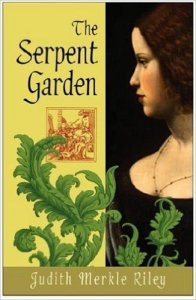 So I discovered this new-to-me author last week: Judith Merkle Riley. Her historical novel, Serpent Garden, is set in Tudor England and France, and it’s an absolute delight. Riley juggles multiple points of view, a complex mixture of historical fact and conjecture, ingenious details of her period setting, and a whiff of the supernatural. All this plus an engaging first-person narrator whose love story bounces along happily.
So I discovered this new-to-me author last week: Judith Merkle Riley. Her historical novel, Serpent Garden, is set in Tudor England and France, and it’s an absolute delight. Riley juggles multiple points of view, a complex mixture of historical fact and conjecture, ingenious details of her period setting, and a whiff of the supernatural. All this plus an engaging first-person narrator whose love story bounces along happily.
After reading the first part of Serpent Garden, I did what I usually do when I find an author who grabs my interest—I went to Amazon to find what other books she had available. There were six more novels, three of them a YA trilogy. Interesting. I wondered what she was currently working on and looked for her website. And this is where things started to get, well, strange. Her website consisted of a single page, a list of her six novels with links to Amazon and Barnes and Noble. Given the number of positive reviews Riley’s books had from major sources like Kirkus, I was amazed. Why didn’t she have a more developed website?
Then I happened to glance at the short bio for Riley that was posted on Google. The most important information was right there at the top, her birth date and her death date. Riley died in 2010. I had two reactions to this news: I was saddened, first of all. But then, selfishly, I was stricken by the thought that six novels was all we’d ever have.
We readers are voracious, and we always want more. Once we discover a novelist we like, we keep demanding product. Some writers, like Grace Burrowes, are remarkably productive, giving us book after book to feed our habits. Some, like Susan Elizabeth Phillips, work more slowly, so that each book becomes a kind of event.
And some authors simply opt out. Julia Ross wrote wonderfully ornate historical novels a few years ago, including The Seduction, Clandestine, and Games of Pleasure. But after several years of turning out one novel after another, she hit the wall. She simply couldn’t write anymore, as she herself explains. Another of my favorite writers, Judith Ivory, simply disappeared after a bout of ill health.
So are we readers at fault when writers go missing? Nope. But it might be a good idea occasionally to think about those writers whose books you depend on. Maybe they need a little encouragement, or even a little gratitude. So please Sherry Thomas, Joanna Bourne, Loretta Chase, and Mary Balogh keep writing—I love everything you’ve done. Please Anna Cowan, write a second book: Untamed was awesome. Please Karen Rose and Tess Gerritsen keep bringing those thrillers out, even though writing them must take a toll. And oh, Jane Haddam, please don’t stop. I need my Gregor Demarkian fix each year.
And Judith Merkle Riley I wish I’d found you a few years ago. I really wish I could have told you what a wonderful writer you really are. Now all I can do is leave a review on Amazon and feel sad.
 I just finished rereading one of my favorite books of all time, Slightly Dangerous by Mary Balogh. There are a lot of reasons I love this book—it’s the culmination of a series, this one about the Bedwyn family, and it concerns the romance of the bull goose Bedwyn, Wulfric, Duke of Bewcastle. Wulf falls in love with a woman who’s totally wrong for him—wrong class, wrong temperament, wrong age, etc. But one of the things that makes this book work so well is that it’s a rare story where the “he-won’t-say-he-loves-me” trope actually works.
I just finished rereading one of my favorite books of all time, Slightly Dangerous by Mary Balogh. There are a lot of reasons I love this book—it’s the culmination of a series, this one about the Bedwyn family, and it concerns the romance of the bull goose Bedwyn, Wulfric, Duke of Bewcastle. Wulf falls in love with a woman who’s totally wrong for him—wrong class, wrong temperament, wrong age, etc. But one of the things that makes this book work so well is that it’s a rare story where the “he-won’t-say-he-loves-me” trope actually works.